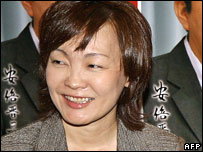
Akie Abe says she and her husband considered adopting a child
|
Japan's new first lady has given an unusually frank magazine interview about her infertility.
Akie Abe, 44, married to Prime Minister Shinzo Abe since the age of 25, said she had decided to answer questions about the couple's childlessness.
Prime Minister Abe has encouraged the Japanese to have more children to halt a plummeting birth rate.
Mrs Abe's comments, including the revelation that the couple considered adoption, are highly unusual for Japan.
In the interview with a monthly magazine, Mrs Abe said she had been under pressure to have children.
"Of course, as the wife of a politician, I was under enormous pressure, including from his constituency," she told Bungei Shunju.
"Now that it has become difficult because of my age, people have stopped telling me to keep trying. But in the very early stages, I did have fertility treatment."
Japan's fertility rate - the average number of children a woman will give birth to in her lifetime - dropped to a record low of 1.25 in 2005.
'Fate'
The former DJ said her husband had once suggested that they should consider adopting a child.
"I could not accept this and was not confident about bringing up an adoptee properly, so it did not happen," she said.

Prince Hisahito was born in September
|
Although adoption within an extended family is a tradition in Japan, adopting a non-relative is incredibly rare.
Mrs Abe said she had accepted that her role was to be of service in another way, instead of bringing up children.
"I think it is all fate and I have to accept it - the fact that I married a politician, that he became prime minister and that we were not blessed with children," she said.
The pregnancy of Princess Kiko generated intense public interest in Japan.
The subsequent birth of a baby boy avoided a succession crisis as, according to Japanese tradition, only males can succeed to the throne.